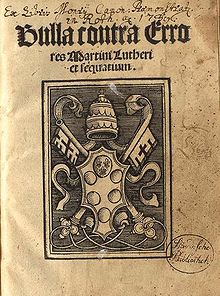Erfurt Pfaffenstürmen

As Erfurt Pfaff storms riots are called, which in early summer 1521 in Erfurt took place.
The background was the opposite of Martin Luther directed Papal Bull of Excommunication , which also includes any sympathizers in danger brought to apply as a heretic, and thereby caused a nervousness in the universities. In August 1520 an anonymous pamphlet was published under the title "Erfurt Announcement in favor of Martin Luther" ( Intimatio Erphurdiana pro Martino Luthero ). The text called for people to stand up boldly for the word of God, to fight back against Luther's enemies and, in particular, to tear the bull threatened with excommunication into small pieces. Allegedly it was a declaration of solidarity by the Erfurt theological faculty, but in fact it was probably the work of individual lecturers, such as Justus Jonas , and sympathetic students. The intimatio was posted on the door of the Great College at night , an action in which residents of the Silesian Bursa pauperum were involved - the university investigated the matter, but could not clarify the details.
Erfurt students viewed themselves as fighters for the Luther cause. When Luther's outspoken opponent Johannes Eck traveled to Erfurt as papal nuncio , armed students allegedly lay in wait for him and prevented him from entering the city.
In October 1520, the Erfurt printer Johannes Knappe offered copies of the bull for sale; Students took them, shredded them and threw the scraps into the water, with the words: "It's a bulla (the Latin word also means air bubble), it should swim in the water!" The printer was not reimbursed for his damage, the participants in this action were not prosecuted.
In May and June 1521, there were parish storms , militant actions by supporters of Luther. In addition to students, skilled workers, members of the lower nobility and farmers were also involved. The reason for this so-called Erfurt Pfaffenstürmen were church sentences that had been imposed on three canons (Nikolaus Rottenhöfer, Johannes Draconites and Justus Jonas) for taking part in a drink with Luther. The students, like Crotus Rubeanus as principal, demanded that these sentences be withdrawn. That also happened in the case of Rottenhöfer and Draconites - Jonas was no longer concerned, because he had traveled on to Worms with Luther. Nevertheless, the situation escalated. In the curia of cathedral immunity, status symbols of the canons , such as glass windows, books or mosaic tables, were destroyed. Draconites property was also ravaged. The unrest had gained momentum independently of the occasion.
Meanwhile, Luther was incognito in the Wartburg . He disapproved of the excesses, but also sympathized with the actors.
literature
- Thomas Kaufmann : The beginning of the Reformation. Studies on the contextuality of theology, journalism and staging of Luther and the Reformation movement. 2nd, revised and corrected edition. Mohr, Tübingen 2018, ISBN 3-16-156327-1 , pp. 209-217.
